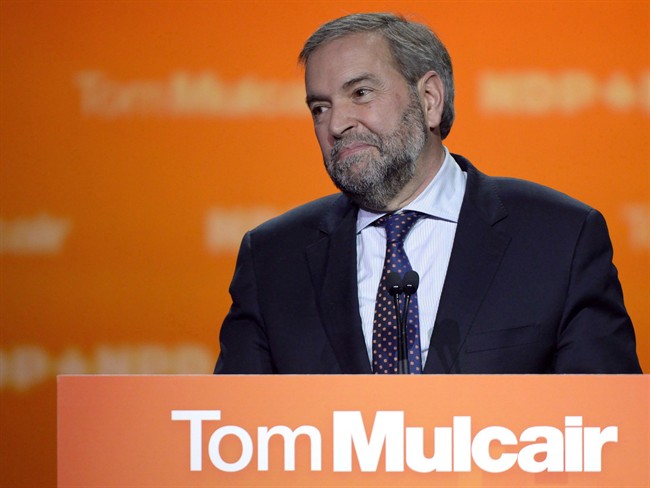Tom Mulcair hit the interview circuit ahead of this weekend’s NDP convention – where delegates will choose whether to keep him on as party leader. And what he’s saying now is a little different from what he said a few months ago.

READ MORE: Will Tom Mulcair still be NDP leader on Monday?
Take oil, for example. During the election campaign, Mulcair talked about partnering with corporations on developing the oil sands. “We’re in favour of creating markets for our natural resources, we’re in favour of developing them, but that has to be done sustainably,” he said.
And this Wednesday, he told CBC’s Peter Mansbridge that if his party decides they want to keep oil in the ground, he will “do everything I can to make that a reality.”
Or for an even starker example, look at his position on balancing the budget. During the election, he was adamant that the NDP would balance the books. However, in a scrum the day before the first Liberal budget was tabled, he said what was important wasn’t running a deficit – it was helping Canadians.
“We still think that right now that if it comes down to it, we have to help people before anything else. It’s not a question of deficit or not deficit. It’s providing the help that struggling Canadians need.”
Mulcair has also taken a stand on other issues: calling Donald Trump a “fascist” in a video sent out by the NDP for example, or tweeting #IBelieveSurvivors after the Jian Ghomeshi verdict.
WATCH: Tom Mulcair calls Donald Trump a fascist

Stephen Azzi, an associate professor of political management at Carleton University and former Liberal staffer, thinks that Mulcair is adapting his message to the circumstances.
“I think during the campaign he was trying to make himself acceptable to a lot of people who had traditionally voted Liberal, who had temporarily parked their vote with the NDP in 2011 because they weren’t happy with what the Liberal Party had been up to. And he wanted to make them feel at home,” he said.
“Now, he’s desperately trying to appeal to the core of the NDP support and let them know that he’s one of them.”
Calling Trump a fascist has no real effect, he said, but it makes some NDP supporters happy. “He’s very much holding onto his job and doing what he has to do to do that.”
Others aren’t quite so harsh. Melanee Thomas, an assistant professor of political science at the University of Calgary thinks that these recent pronouncements aren’t out of character for Mulcair – they’re just not part of the “prosecutor” or “Angry Tom” image that he had cultivated before and during the election.
Who to blame?
Mulcair was most effective as a prosecutor in the House of Commons, she said, and Canadians responded well to his performance there before the election. But the election was different.
“Translating that into a kind of campaign narrative, or to a general narrative outside of the institution of the House of Commons is very challenging,” she said. “I think part of this is just a difficulty figuring out how best to present this particular leader to the public.”
But she doesn’t think that it was Mulcair’s image problems that sunk the NDP campaign. One real factor on the image front were the very low expectations set for Trudeau, and the comparatively high ones for Mulcair. Trudeau couldn’t help but look like a success, and Mulcair couldn’t meet the high bar.
More than that – she thinks that Mulcair’s performance was fairly typical of the first campaign by a new leader and exhibited the normal “growing pains” that other leaders, like Layton in 2004, also had.
Even Azzi thinks Mulcair ran a fairly good campaign, and is being unfairly blamed for the result. “The NDP came to believe that their success in 2011 was a result of what they had been doing and not the result of the self-immolation of the Liberals,” he said.
“So when things didn’t go the way they wanted in 2015, they blamed Mulcair.”
Identity crisis
But whether Mulcair stays or goes isn’t the big question for the NDP this weekend, according to Alex Marland, associate professor of political science at Memorial University.
“Right now the NDP is going through a bit of an identity crisis,” he said. “They’ve been outflanked on the left really by the Liberals. And so, they’re trying to figure out what to do.”
He thinks the NDP should figure out what their brand is, before thinking about their leader’s.
“Let’s say there’s a different leader. It’s a woman or a man who’s leading the party. Great! Now what? So you’ve put a different face on it.”
The NDP should concentrate on defining the two or three issues or principles that they can represent, then think about picking a leader to represent that, he said.
Azzi thinks that the NDP vote on Mulcair will send a clear signal – and not just about the bearded leader’s future. The decision will show what direction they want to take the party in the future.
“If they keep Mulcair, they’re signalling really clearly that they want to be contenders for power and that they’re willing to make sacrifices and sometimes play down certain issues as a way of getting of elected,” he said.
“If they get rid of Mulcair, I think we’re back to the NDP of 20, 30 seats, that believes that it’s the conscience of Canada and will speak out on a small range of issues but never be as relevant as it could be.”


Comments